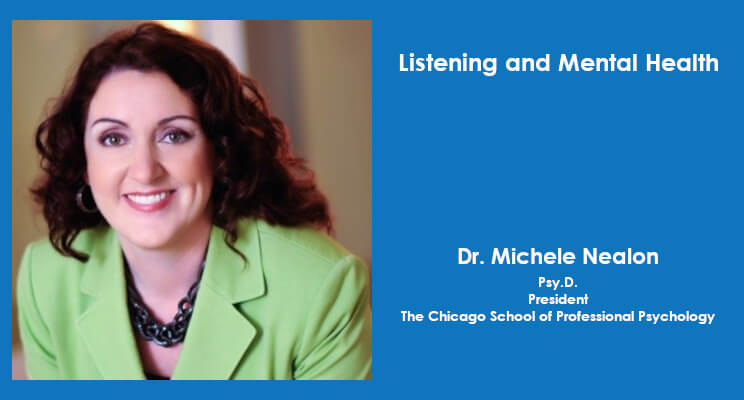
Listening and Mental Health
Decades from now, 2020 will be remembered as the year when much of life stood still. As we struggled under the weight of a worldwide COVID-19 crisis, and the related economic and social consequences that accompanied it, a second pandemic took shape: a mental health pandemic. It is this second challenge to our collective health that is likely to outlast even the most lingering effects of the Novel Coronavirus, and that portends a generation of psychological struggles.
Make no mistake; depression was already far too prevalent in our society. According to the World Health Organization 264 million people globally—more women than men—are affected by depression, making it a primary cause of disability around the world. For those already struggling with this insidious illness, matters only became worse as the COVID-19 crisis worsened, while thousands of others embarked anew on their own mental health battles. Although the National Alliance for Mental Illness (NAMI) acknowledges distinctions between mental health conditions and mental illness, it addresses the levels of mental health disorders as one, reporting that one in five of us—both in the U.S. and across the globe—experiences such an illness each year. Such illnesses can be situational, or they can be lifelong. Half of lifetime mental illness begins by age 14, and 75% of cases by age 24.
We all know about mental health issues. We have friends, family, or coworkers who have suffered the debilitating hopelessness and loss of motivation that are telltale indicators of depression. But how many of us “listen” when symptoms are described, when a loved one shares their fears and uncertainties, or when a colleague continually calls in sick?
Are we starting to listen now? Are we attempting to truly understand the challenges facing so many of those around us? Too often, mental health illness comes wrapped in an invisible shroud of stigma. We equate it with weakness, or worse, with a detachment from reality. We don’t understand it, so we’re afraid of it.
The psychological phenomenon known as confirmation bias is an all-too-common obstacle that prevents us from absorbing the full implications of mental health illness or accepting the breadth and depth of the affliction facing friends or loved ones. People are prone to believe what they want to believe. As a result, even as we seek out information on mental health, telling ourselves that we are doing our best to educate ourselves, we unconsciously filter the facts that are presented, dismissing those that contradict our preconceived beliefs, and shaping our interpretation of those facts in ways that reinforce what we already “knew” to be true.
As we slog our way through the viral pandemic that has upended our lives, we must open our minds to the blight of mental health issues—depression, unchecked anxiety and addiction, to name the most common—that surround us, and that represent a plague layered onto another plague. We must be aware of our tendency toward confirmation bias and be willing to accept realities that challenge our long-ingrained thoughts.
In other words, we must listen. We must focus our minds on the words being spoken by those around us, and the true implications that accompany those words. We must refrain from thinking ahead to our response, our doubts, our rebuttal. We should prepare ourselves to ask questions, questions that deepen our understanding, and allow us to absorb and accept facts that challenge our preconceived ideas.
When we truly listen, we begin to understand. When we understand, we can prepare ourselves to intervene. And when we do intervene, we can effect change—change in our personal lives or in the lives of those we care about, change in how we run our business or refocus the work of our organization. Listening prepares us to fine-tune our responses to mental health issues in ways that can bring about needed change.
- We will be prepared to act and respond in ways that are person-centered, focused on the individual rather than the illness.
- We can ensure that we are inclusive in our responses, understanding the challenges faced by all with whom we interact.
- We can avoid the use of derogatory language to describe mental health illness and take the lead in eradicating the use of inaccurate and harmful terminology that perpetuates the accompanying stigma.
- We can work to understand the cultural differences that determine how individuals perceive and react to mental health issues in their families, and how willing they are to accept help.
We have a long road ahead of us. While vaccines offer a long-awaited light at the end of the COVID-19 tunnel, the ravages of mental health conditions that emerged or worsened during the pandemic will require a much longer effort. We can all be part of the solution—a solution that begins with listening.
